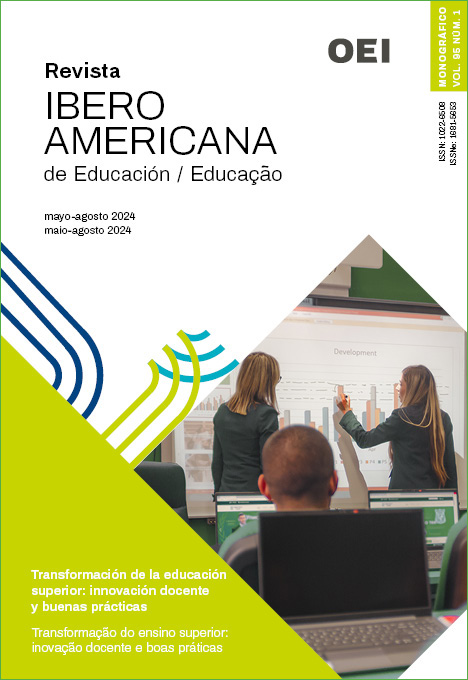Social-emotional development and its effects during the pandemic in families of Colombian educational institutions
DOI:
https://doi.org/10.35362/rie9516043Keywords:
Confinement, emotions, socio-emotional development, family, educational institutionsAbstract
The crisis generated by the Covid 19 virus affected fields of human activity, its dimensions, physical and emotional; overflowing the benefits of science and marginalizing the power of economies; powerless to control the crisis. Covid 19 has impacted routines such as going to work, getting up, eating, returning home, loving, communicating, transportation, physical and recreational activity; to dimensions exposed to situations of daily life, of the context that surrounds the subject, which transcends its full development. Emotions, a field of reduced attention, are the subject of research carried out in six educational institutions in Bogotá and Cartagena based on information collected by completing a survey by 297 families. The research sought to identify the effects of confinement on the socio-emotional development of families of 6 educational institutions, observing the impact on their socio-emotional development. The problem posed is: What were the effects of confinement during the pandemic on the emotional development of families and its effects on student learning? The results show a predominance of positive emotions such as satisfaction, confidence, enjoyment and self-esteem. The negative ones were associated with fear, shame, threat, hopelessness and anxiety as a feeling of helplessness in the face of the crisis.
Downloads
References
Álvarez, J. M. (2013). Evaluar el aprendizaje en una enseñanza centrada en competencias. En J. Gimeno, Educar por competencias, ¿Qué hay de nuevo? (pp. 206-233). Morata
Díaz-Barriga, A. (2020). La escuela ausente, la necesidad de replantear su significado. En H. Casanova Cardiel (Coord.), Educación y pandemia: una visión académica (pp. 19-29). Ciudad de México: Universidad Nacional Autónoma de México, Instituto de Investigaciones sobre la Universidad y la Educación. https://go.oei.int/qe1zx0g7
Heredia, Y. (2020). El desarrollo emocional es tan importante como el académico. Observatorio de Innovación Educativa, blog académico, Tecnológico de Monterrey. https://bit.ly/44yR4Y8
Hernández, R., Fernández, C. y Baptista, P. (2006). Metodología de la Investigación (4ª ed.). MacGraw-Hill.
IISUE (2020). Educación y pandemia. Una visión académica, México, UNAM. https://go.oei.int/bxqdcicm.
Kelchtermans, G. y Deketelaere, A. (2016) La dimensión emocional en convertirse en docente. En J. Loughran y ML Hamilton (Eds.). Manual internacional de formación docente, Vol. 2. (pp. 658-709).
Maturana, H. (2002). Transformación en la convivencia. Ediciones Dolmen.
Lange, J., Heerdink, M.W. y van Kleef, G.A. (2022). Lectura de emociones, lectura de persones: percepción de emociones e inferencias extraídas de las emociones percibidas. Opinión actual en psicología, 43, 85-90. https://doi.org/10.1016/j.copsyc.2021.06.008 DOI: https://doi.org/10.1016/j.copsyc.2021.06.008
Mesquita, B. (2007). Las emociones están situadas culturalmente. Información de ciencias sociales, 46(3), 410-415
Moreno, T. (2016). Evaluación del aprendizaje y para el aprendizaje: reinventar la evaluación en el aula, México: UNAM, Unidad Cuajimalpa. https://bit.ly/4b7RF5B
Muslow, G. (2008). Desarrollo emocional: Impacto en el desarrollo humano. Edução, 31(1), 61-65.
Ortiz, J. V. (2021). Reflexiones de un maestro colombiano en torno a la evaluación durante la pandemia. Consejo Mexicano de Ciencias Sociales (COMECSO). https://go.oei.int/x0csnmo3
Pacheco, J. S., y Velasco, C. A. (2023). Covid-19: algunos efectos delictuales con impacto en la convivencia y seguridad en Colombia. Revista Criminalidad, 65(2), 123–144. https://doi.org/10.47741/17943108.488 DOI: https://doi.org/10.47741/17943108.488
Saavedra, J. (2022). Latinoamérica vive la crisis educativa más grave de los últimos 100 años. Banco Mundial. https://go.oei.int/7pyx2i5m.
Sancho, J. M., Correa, J. M., Giró, X. y Fraga, L. (Coord.) (2014). Aprender a ser docente en un mundo en cambio. Simposio internacional. Barcelona: Dipòsit Digital de la Universitat de Barcelona. http://hdl.handle.net/2445/50680
Tamir, M., Schwartz, SH, Cieciuch, J., Riediger, M., Torres, C., Scollon, C., Dzokoto, V., Zhou, X. y Vishkin, A. (2016). Emociones deseadas a través de las culturas: una cuenta basada en valores. Revista de Personalidad y Psicología Social, 111(1), 67-82. https://doi.org/10.1037/pspp0000072 DOI: https://doi.org/10.1037/pspp0000072
UNESCO (2020). Global Education Coalition. UNESCO. Organización de las Naciones Unidas para la Educación, la Ciencia y la Cultura. https://go.oei.int/c3drlzpc.
UNICEF (2022). Dos años después: Salvando a una generación. Primer reporte con base en evidencia de la catástrofe educativa en América Latina y el Caribe. https://bit.ly/3Uy6szu
Zabalza, M. A. (2003). Competencias docentes del profesorado universitario. Calidad y desarrollo profesional. Madrid: Narcea.
How to Cite
Published
Issue
Section
License
Copyright (c) 2024 Iberoamerican Journal of Education

This work is licensed under a Creative Commons Attribution 4.0 International License.
Any authors who publish with this journal accept the following terms:















